- From Faith Current: “The Sacred Ordinary: St. Peter’s Church Hall” - May 1, 2023
- A brief (?) hiatus - April 22, 2023
- Something Happened - March 6, 2023
I‘m taking the occasion of The Rolling Stones’ 50th anniversary to declare the first-ever Hey Dullblog open thread. Any thoughts/opinions/stories about The Stones are welcome in the comments, especially if they have some relation to Our Guys, no matter how tangential.
This is an experiment; if everybody has fun, we’ll do more open threads.
I’ll start it off with what I immediately thought of this morning, when NPR told me it was 50 years since The Stones’ first gig:
You know, they’re congratulating the Stones on being together 112 years. Whoooopee! At least Charlie and Bill still got their families. In the Eighties, they’ll be asking, ‘Why are those guys still together? Can’t they hack it on their own? Why do they have to be surrounded by a gang? Is the little leader scared somebody’s gonna knife him in the back?’ That’s gonna be the question. That’s-a-gonna be the question! They’re gonna look back at the Beatles and the Stones and all those guys as relics. The days when those bands were just all men will be on the newsreels, you know. They will be showing pictures of the guy with lipstick wriggling his ass and the four guys with the evil black make-up on their eyes trying to look raunchy. That’s gonna be the joke in the future, not a couple singing together or living and working together. It’s all right when you’re 16, 17, 18 to have male companions and idols, OK? It’s tribal and it’s gang and it’s fine. But when it continues and you’re still doing it when you’re 40, that means you’re still 16 in the head.”
John Lennon, 1980. Discuss.

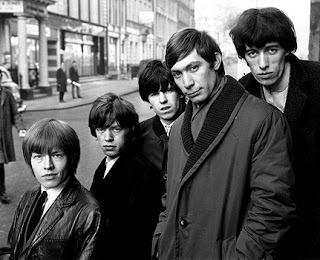

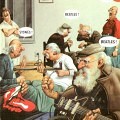

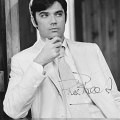
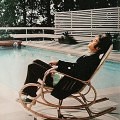

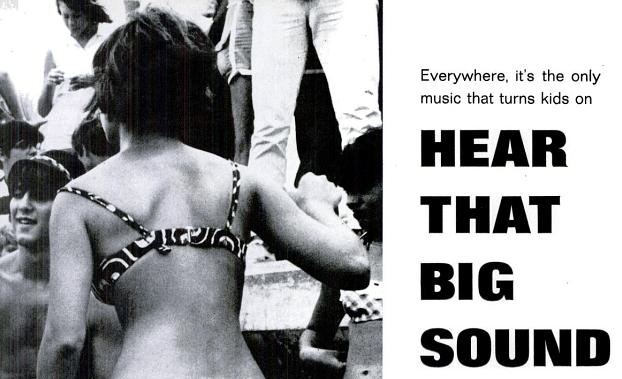
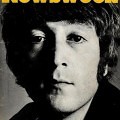


I love the Stones. I think that they are sometimes considered superior musicians to the Beatles for the simple fact that they were able to tour in ’69 and beyond, using modern PA equipment. They also toured with a killer horn section, Billy Preston, Ian Stewart and Nicky Hopkins. Hows about that? I really love it when Mick and Keith sing together. Keith’s backup vocals add something special. Their early stuff can be rather shoddy compared to the Fabs. Listen to the minor train wreck at the 1:30 mark here, in this otherwise great song:
http://www.youtube.com/watch?v=_UKh9zszngc
George Martin never let that kind of thing happen in a Beatles record.
@King, I haven’t heard that song for ages and wow, what the hell happened there?
I love the Stones after they’ve fully become themselves, but before they’ve run out of new tricks–say 1968-72. My primary thought listening to that Youtube was, “This sounds like a Chicago blues record I have, only less well-performed and more boring.”
I think The Stones are a great bar band. But they don’t interest me any more than a zillion other bands from the period; they’re simply very limited in what they were about, and trying to get across. And I’ve given them plenty of opportunity to convince me–I saw that recent doc on “Exile on Main St.” and enjoyed it. There’s a calculated, packaged aspect to The Stones that bores me stiff, but it’s precisely why they’ve been able to stay together for 50 years. Every time you change, you take a chance, and lose some fans. The Stones are the McDonald’s of rock, with all the strengths and weaknesses that implies.
I think Charlie missed the beat on his kick drum right there. Being under the time constraints they were under at the time, I guess their producer just thought “who cares, the kids will never know”… All of the Stones best stuff came from the times when they were truly living as outlaws. I personally think that it is Mick that has kept the band from being interesting for the past 30 years. He is so insecure that everything has to be calculated, like you say. He is an amazing performer, but by trying to keep the band ‘hip’ he has made them super lame. Their studio albums from the 90s always had one or two good tracks, and a couple of cool Keith songs, but then the rest of it is like.. the dust brothers make the Stones sound trip hop, or something. Sad. For all the critical drubbing Macca has taken over the last couple of decades, his solo output is freaking amazing, and he comes off as a lot less contrived. The family man that was mocked for so long has aged a lot better than the outlaws of yore.
Count me as a fan of their early stuff…their cover of “She Said Yeah” is unbelievable.
“Mother’s Little Helper” is a brilliant and scathing riposte of the older generation’s hypocritical attitude regarding drug use.
In fact, one might argue that MLH was decades ahead of its time in exploring the social problem of addiction to prescription drugs.
I have never understood the acclaim critics give the Stones for being a great live band. I can think of a couple of instances when the Stones were blown off the stage by other performers…like, say, by The Beach Boys and James Brown at the T.A.M.I. Show and by The Who in “Rock and Roll Circus”.
I haven’t enjoyed any of the Stones’ live performances either in person or on record—to me they always seem ragged and I have have to struggle listening to the first few bars to suss out what song the band is trying to play.
I think John Lennon would have LOVED to have been in The Rolling Stones…he would have been right at home with Mick and Keith as a fellow suburban college kid pretending to be the tough guy he never was.
I think Keith would have LOVED to have been in The Beatles. Keith was mates with John and George, and he wouldn’t have minded being an “invisible man” playing 2nd rhythm or 2nd lead guitar. But boy, he would have stood out like a sore thumb on the front line with good-looking John, Paul, and George. It took years for Keith to grow into his looks, and he didn’t have those for long.
@Anon #1, I’ll have to check out “She Said Yeah.” I WANT to like the early Stones, because I like their influences and their contemporaries. And totally agree on “MLH.” (BTW, The TAMI Show was filmed right here in downtown Santa Monica!)
@Anon #2, I think you’re right on both counts.
Does anybody have an opinion about Brian Jones?
First, let’s give honor to the Stones as the greatest blues-based rock band. Nobody does the stuff they do best better.
Thinking of them in comparison with the Beatles, the lineup changes are striking. After Brian Jones’ death, that “second guitarist” spot was held first by Mick Taylor and then by Ron Wood. Nothing wrong with that, and this kind of thing is more and more common in long-surviving bands, but it’s telling that the Beatles wouldn’t have been the Beatles with any of the four iconic members missing. And as much as people have been nominated for “fifth Beatle” status, that’s very much an ancillary role, however important.
One thing the bands have in common is being driven importantly by a songwriting partnership (Jagger/Richards allegedly having gotten the idea of writing their own material from the Lennon/McCartney working relationship). I think the Lennon/McCartney partnership produced a wider and deeper range of materials, but then, that’s why I’m writing for this blog instead of a Stones one.
On the Lennon quote: man, to me this captures an attitude he cops that I just can’t stand: “I have seen the light and know The Way.” He’s taking his feelings and making them universal truth (all bands composed only of guys = tribal and immature). And I have to say, “Defensive much?” This reads as an apologia for his working with Yoko Ono instead of the Beatles, and presenting that as the “mature” choice. Hey, maybe he had to do that, maybe that worked for him, but he’s protesting too much.
The years since have shown that the view Lennon expresses here is way too simplistic (for example, U2 has been together for decades now, with its original lineup intact, and it hasn’t stopped them from having successful marriages, children, etc.).
The world’s richer for having both Beatles and Stones music in it, but I agree with Michael that the Stones feel “limited in what they are about.” The Beatles are about everything, and even Lennon’s over-the-top pronouncements are a part of that.
Nancy, you hit the nail on the head.
I also can’t stand the Lennon attitude encapsulated in that quote, both his defensiveness about having “outgrown” the male group-gang and his overcompensating compulsion to put down his musical competition. (Jagger got the worst of this, but Dylan was a favored target of John’s gratuitous put-downs literally to the end of his life (read the Playboy interview, or hear the several Dylan parodies from the Dakota years contained in the Lennon box.) I have always detested the song “Watching the Wheels,” partly because I find it musically insipid but mostly because its lyric is a sustained catalog of more-evolved-than-thou bullshit cliches. “No longer play the game” my ass.
The Stones: Each band could do things the other not only didn’t do, but couldn’t have guessed how to do. Just as the lanky, groove-seeking Stones never approached the dynamic intricacies of “Happiness is a Warm Gun,” the Beatles were never quite loose or intuitive enough to create a shambolic masterpiece like “Loving Cup.” (Even a standard blues-soul construction like “12-Bar Original” was utterly beyond their power to invest with drive, drama, sex, or anything else that makes that music cook.)
Mike is of course right that 1968-72 is the Stones period that “matters”–when they were chasing neither Chuck Berry nor the Chicago blues nor the Beatles nor swinging fashion, and became and existed and created as themselves for one magnificent stretch. I love early tracks like “She Said Yeah,” “I’m Free,” “Play with Fire,” “Little Red Rooster,” “You Better Move On,” and their cover of “I Wanna Be Your Man” (which smokes Ringo’s version). I also love the mid-period LPs: Aftermath, Between the Buttons, Satanic Majesties. But only in 1968-72 do they quit being inspired derivatives and create music that distills their chemistry and outstrips their sources.
Speaking of which, the Stones were more limited musically and culturally than the Beatles for many reasons, but one important one is that they were more limited in their sources. The Beatles could go more places and push sounds and ears farther out because they were themselves coming from so many different places: not just rock and R&B but skiffle, country, girl group, cabaret, show tunes, etc. They were bound to reach a bigger audience and leave a bigger impact on music for that reason alone. Their personalities and group chemistry took care of the rest.
“(Even a standard blues-soul construction like “12-Bar Original” was utterly beyond their power to invest with drive, drama, sex, or anything else that makes that music cook.)”
Oh, I don’t know about that.
Listen to The Isley Brothers’ “Twist and Shout” back-to-back with The Beatles’ version.
Or Barrett Strong’s “Money”.
Or The Miracles’ “You Really Got A Hold On Me”.
Or The Marvelettes’ “Please Mr. Postman.”
To me, The Beatles’ versions of each of these songs are more invested with drive, drama, sex, and cookin’.
Anonymous, the ones you mention all cook, but different genres cook differently. I’m talking specifically about the soul and R&B genres exemplified in Chicago and Memphis studios, which the Stones could creditably purvey (“Who’s Driving Your Plane”) and the Beatles, on available evidence, couldn’t.
Their covers of “Twist and Shout” and “Postman” and “Money” are straight-out rock ‘n’ roll, not soul or R&B (and with the exception of the last, none of the originals is properly classed as soul either, but rather r&r and pop, respectively). The Beatles’ “Money” massacres the Stones’ version, but again, as rock ‘n’ roll, not soul.
“You Really Got a Hold” deserves an exception: Smokey’s original is indubitably soul music, and John’s cover, amazing thing that it is, virtually invents a new genre–white soul that is not blue-eyed but something a whole lot more dangerous, sexual, lustful. There’s a grown-up menace in that recording that the callow Stones of 1963 could never approximate.
Devin, you are right. In terms of 1960s black music, The Beatles identify most strongly with Motown, while the Rolling Stones are Chess/Stax.
Brian Jones… I could be wrong, but I always saw him as a brilliant technician, the type who could pick up any instrument and perform admirably, but who couldn’t write a song or be creative in any other way. I’ve known musicians like that. They obsess about string gauges and pickups and amp settings, demonstrate real skill in everything they do (mistaking it for artistry), but despite it all there’s something missing behind their eyes. They tend to put everything second behind their technical skills, treating family and significant others like disposable tissues. Brian was ahead of his time with his interest in world music, I’ll give him that.
Imagine a parallel universe where the power struggle between John & Paul reached epic heights until John was found dead in his pool, and replaced with Denny Laine, and the Beatles continued touring into the ’90s, when George was replaced with Dave Spinozza, and the touring and albums continued. A strange universe.
When Frank Thorogood confessed on his deathbed that he killed Brian, I was amazed at how little anyone noticed or cared.
– Hologram Sam
Does anyone remember the commercial for “Rice Krispies” that Brian Jones wrote and the Stones recorded?
http://www.youtube.com/watch?v=rl4zS_59RD8
I remember in high school, the cool kids liked the Stones because they were tougher and more authentic than the Beatles. I was put down for my Beatle enthusiasm, but I don’t recall the fab four ever shilling for breakfast cereal.
– Hologram Sam
Taking the Motown thing another step, check the Stones doing “My Girl.” It’s sweet but close to awful. The antithesis of soul, blue-eyed or any other kind. Not that the Beatles would likely have done any better with that particular silky piece of Smokey soul, but maybe part of their genius was knowing which Motown songs they could blow out of the water and which were best left untouched.
Lennon’s sheepishness aside, I’ve always felt that The Beatles’ relationship to their influences was different than other groups, and you see this in their covers.
When The Stones, Yardbirds, John Mayall, etc do Chicago blues, they’re turning it into something less than the original, something less strange and challenging that white audiences felt comfortable consuming. British blues is–the varying sincerity of the performers aside–primarily a commercial phenomenon requiring the diminishing of the original art. Obviously this is just an opinion, but you just will never convince me that The Stones were better bluesmen than Howlin’ Wolf or Muddy Waters, or better soul than Otis Redding, Wilson Pickett, Sam and Dave, etc. They are imitators whose only advantage is skin color and faux-rebellious packaging.
I just listened to The Stones’ cover of “Can I Get A Witness” (1964), and I literally couldn’t wait for it to finish so I could listen to the Marvin Gaye version again.
Stones: http://youtu.be/2bhHe85PR5U
Gaye: http://youtu.be/DHzPg94SR4Q
That Stones song is just hauntingly pedestrian. And I’m speaking as someone who loved soul music before I loved The Beatles. (Now the truth comes out!)
But when The Beatles do an Arthur Alexander tune, they thoroughly Beatlize it; they make it something more than the original. It’s like Hendrix’s version of Hey Joe or Killing Floor; the cover is either unquestionably better than the original, or so different that it doesn’t diminish the original song.
Howlin’ Wolf “Killin’ Floor” (1964):
http://youtu.be/EGIE28q3fEA
Jimi Hendrix Experience doing the same song at Monterrey Pop (1967):
http://youtu.be/_742k-ExYwA
I love the Isley Brothers, but The Beatles’ own “Twist and Shout.” I love Smokey, but Lennon’s “Please Mr. Postman” is a fundamentally different beast.
So this is my beef with The Stones, from soup to nuts: except for about four years out of the last 50, they’re more a commercial phenomenon than a musical one. First, they are the Pepsi to The Beatles’ Coke; later, they are the self-appointed standardbearers of “rock.” And its because they’re primarily a commercial thing–a business proposition–that they’ve been able to survive for 50 years. They’re like a furniture company, not a musical group. “Supplying Chicagoland with fine custom sectionals since 1963!”
Yes, “Satisfaction” is a great song. I also like Pepsi occasionally. But The Stones feel “false” in the way that The Beatles or Hendrix feel undeniably “true.” And that’s never more clear than when they do covers.
Devin: Your rant about John’s quote is really on the money. I love reading John’s interviews but there are many, many times when I really just want to interrupt him going off on someone (including his favorite target, Macca) and say, “SHUT UP, JOHN.”
At any rate, that quote is revealing. Especially this bit: “It’s all right when you’re 16, 17, 18 to have male companions and idols, OK? It’s tribal and it’s gang and it’s fine. But when it continues and you’re still doing it when you’re 40, that means you’re still 16 in the head.”
With John’s quotes, he often said the opposite of what he really meant. And I think John Lennon, in 1980, desperately missed his boys, and missed being part of his band of brothers — no matter what he said in that interview.
As for the Stones, they have some great great songs. But too many of their song seems like they cater to the misogynistic, arrested development, “lets party and get laid” male types.
— Drew
Drew,
Excellent point. The Beatles never wrote anything like “Stupid Girl,” “Yesterday’s Papers,” “Under My Thumb,” “Brown Sugar,” “Let It Bleed,” “Starf***er,” or “Some Girls”.
I hold The Stones, along with another plastic soul/blues band, Led Zeppelin, responsible for influencing way too many cock-rock and occult-rock groups.
As misogynists, the Stones outweigh the Beatles on every count–sheer volume of songs, importance of cock to the overall image–but people tend to forget “Run for Your Life,” which trumped the contemporaneous Stones by threatening its subject with murder. It took another four years (“Midnight Rambler”) for Jagger & Co. to get around to killing women, as opposed to simply demeaning them.
Honestly, with a few exceptions, I think people take the Stones’ misogyny too seriously: those nasty songs on “Aftermath” and “Between the Buttons” are not too far off from anything Dylan was writing, except that Dylan had more complicated lyrics. I give them credit for exploring a new angle, heretofore untried, in the pop song.
(And, frankly, they’re not untypical of how jilted adolescent males think and talk about girls who’ve put them down—I see those songs more as venting sexual frustration than anything dangerous. Brian Jones is another story, but Mick and Keith in those days couldn’t really have done anyone much harm. When women sing about men in similarly derogatory fashion, it’s empowerment.)
The sweetness of “Wild Horses”, “Shine A Light,” “You Got The Silver,” and “Winter” belies any lazy characterization of the Stones as insentient hardasses.
These are all good points, Anonymous. I go back and forth on how seriously to take the Stones’ misogyny, but always come down on the side of more rather than less. So much ordinary, everyday misogyny goes unexamined, and so many women suffer for it, that it’s costly to not at least interrogate misogyny that sells millions of copies.
The Stones deserve to be called on their macho shtick, especially when they don’t back it up with evocative lyrics and powerful performance, and the “angle” stays just that–an angle, a pose. “Stupid Girl” is just a stupid song, a rinky-dink recording with witless rhymes, but “Brown Sugar” is high and wild, full of raunchy joy and descriptive touches worthy of a good novelist.
And when women sing comparable lyrics about male conquests (honestly, how often? and who?), it isn’t a double standard, it is empowerment. Maybe not fair, but definitely subversive of the status quo, because they’re working against millennia of assumptions about male supremacy that have been baked into all of us, no matter how enlightened or liberated we imagine we are.
And thank you for mentioning songs like “Wild Horses” and “Winter.” I’d add others like “Worried About You” and “Till the Next Goodbye.” Some of those late ballads, albeit often buried on albums that are mediocre or worse, are remarkably beautiful and touching, and work against the dick-swinging Luciferian image the Stones spent so many years and beads of sweat cultivating.
More’s the pity that they essentially threw in their lot with the one and not the other.
Good points, Devin. I’d simply counter that, when compared with the type of violence fantasies put forward in some contemporary rap, or the witless objectification of seventies cock rock, “Brown Sugar” or “Honky Tonk Woman” seems like rather a different breed of misogyny. The lyrics to “Brown Sugar,” in particular, are too hard literally to understand when listening to the recording to mean much, I should think, to the types of listeners who might take it seriously, while those who actually bother to look them up are probably sufficiently intellectually curious listeners that they’re not really going to take it as a serious endorsement of the activities described therein. Maybe I’m insufficiently sensitive, but in the grand scheme of things, I don’t find the Stones that offensive, and those complaints walk a little too close to the type of political correctness that makes me more uncomfortable—it’s rock and roll, after all. John Lennon’s similarly tongue-in-cheek endorsement of warm guns is equally problematic. The idea in the Sixties was sometimes to shock, offend, and disturb. As a soundscape, “Midnight Rambler” or “Sympathy” do that very well. The lyrics are just part of the sonic picture.
All that out of the way, as I get older, the songs that I come back to most often are those Stones ballads we both seem to enjoy. Often they involve Keith Richards’ harmony vocals, which often sound way more soulful and genuine than anything Mick did, even when he was turning in great performances. I’ll add “Loving Cup”, “Moonlight Mile” (“I am just living to be lying by your side”) and “Waiting On A Friend” to this little ongoing list. It shows that, after about 1971 or so, they were, as you point out, maturing, and songs to the contrary were just playing to type, which is a shame.
(I’ll even nominate “Beast of Burden” to this list, because, “all I want is for you to make love to me” aside, the singer essentially is promising not to bring this woman down—and the “ain’t I rich enough, in love enough” pleading shows something has changed from the early days.)
The Beatles were able to access some better part of human nature, usually, in writing their lyrics, but I don’t think that’s to say that the Fabs’ songs are not problematic (“You Can’t Do That”, “Run For Your Life”) either. Misogyny and rock’n’roll are pretty difficult to disentangle, and I think, at this point, as it becomes something appreciated by a smaller group, it’s best if we recognize it, discuss it, but not let it spoil our enjoyment of the artists’ oeuvre overall.
Years ago, I bought a novelty item, a Digital 8 copy of 25X5,The Continuing Adventures of The Rolling Stones.
I’ve never seen another copy of this. The back of the slip cover says it is for non-commercial private exhibition in homes only. There is no bar code, etc.
Is there any information about this D8 tape? Must not have been many manufactured as the D8 industry was not long lasting.
Further adds to the list of great late Stones ballads: “Torn and Frayed,” “Angie,” “No Use in Crying.”
For the interested, here’s a piece I wrote in 2005, when A Bigger Bang was issued, about the sadness of what the Stones became, or decided to be, against what they could have been, as suggested by the best of their mature work:
http://prospect.org/article/times-we-never-had
Devin, thank you for posting that 2005 piece.
This is an interesting heydullblog discussion. Reminds me again and again why this is my favorite Beatle blog.
The Rolling Stones… I always felt sorry for poor Stu, the keyboardist who was demoted to roadie because he was deemed too ugly to be a Stone. I mean seriously, to be called too ugly to be a rolling stone must do horrible things to one’s self esteem. But he was a talented keyboardist and supremely good-natured.
Here is a fascinating quote by Keith Richards, about how rock ‘n roll changed/evolved away from it’s early rhythmic roots:
“(Rhythm)’s always fascinated me, man, yeah. Mainly because I realized after quite a few years that the thing that really intrigued me, that turned me on to playing, was precisely that – SUGGESTED rhythms going on, or a certain tension. Especially in early rock and roll, there’s a tension between the 4/4 beat and the eighths going on with the guitars. That was probably because the rhythm section was still playing pretty much like a swing band. There was still a regular JAZZ beat, 4/4 to the bar, a swing/shuffle, which is a lovely light rhythm, very African, with a lovely bounce to it. It suddenly changed in ’58, ’59, ’60, until it was all over by the early ’60s… MOST music has (turned its back on that kind of rhythmic ambiguity), in actual fact, because there’s not many people who can do it, so there’s not that much of an opportunity to actually hear it these days. You don’t get a lot of shuffles or swings, but I think it’s something that’s innate in me. I grew up on that beat, even before they added the eights. That swing/shuffle gives it quite a little lift. To me, the eights are the rock, and that lift is the roll.”
– Hologram Sam
Thanks much for the compliment, Sam. It means a lot coming from you–I always perk up when I see your name on a comment.
All interesting points! Check out my take on the 2 – http://musicmovieseconomics.blogspot.in/2012/09/faceoff-beatles-vs.html
I love the Stones, especially for their classic era output – that is up to, and including, Sticky Fingers (I’ve never really seen the attraction of the much praised Exile on Main St.). They truly had something unique, their rhythm and blues roots being obvious, but they did it their own way.
However, it’s been a long time since they made something really significant, and “Start Me Up” is the last song to have gained classic status. They don’t have as many ingredients to play with as the Beatles had, and after all there is a limit on how many variations you can make of a 12 bar blues form (I know they did more than that, but the blues inspiration was their real strength). The Beatles simply had more strings to play on.
Of course, the Rolling Stones tried to follow in the Beatles’ footsteps, especially in 1966 and 1967, but they have always been criticized for it. That being said, an album like Their Satanic Majesties Request is a lot stronger than it usually gets credits for (it is very inconsistent, but there are actually great moments on it), but it should be obvious that it was out of their “jurisdiction”.
So people like to know where they have the Stones, and they can’t escape it. Consequently, they got a problem when they HAD done what they do best, and I feel they should have stopped around 1980.
When the Rolling Stones are mentioned I cannot help but think of Albert Goldman’s quip in his Elvis bio that Jagger is the London School of Economics version of the Blues. I always got a chuckle from that one.